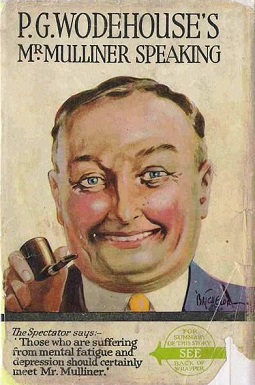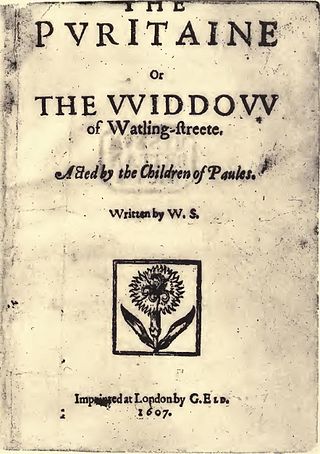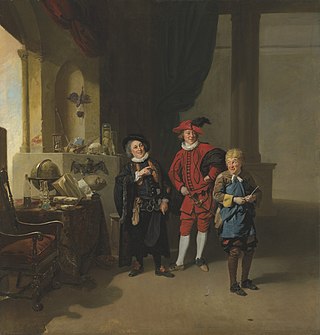Related Research Articles

James Shirley was an English dramatist.
This article contains information about the literary events and publications of 1659.

Mr Mulliner Speaking is a collection of nine short stories by P. G. Wodehouse. It was first published in the United Kingdom on April 30, 1929 by Herbert Jenkins, and in the United States on February 21, 1930 by Doubleday, Doran. The stories were originally published in magazines in the UK and the US between 1924 and 1929.

Murder is Easy is a work of detective fiction by Agatha Christie and first published in the UK by the Collins Crime Club on 5 June 1939 and in the US by Dodd, Mead and Company in September of the same year under the title of Easy to Kill. Christie's recurring character Superintendent Battle has a cameo appearance at the end, but plays no part in either the solution of the mystery or the apprehension of the criminal. The UK edition retailed at seven shillings and sixpence (7/6) and the US edition at $2.00.

The Puritan, or the Widow of Watling Street, also known as The Puritan Widow, is an anonymous Jacobean stage comedy, first published in 1607. It is often attributed to Thomas Middleton, but also belongs to the Shakespeare Apocrypha due to its title page attribution to "W.S.".

The Alchemist is a comedy by English playwright Ben Jonson. First performed in 1610 by the King's Men, it is generally considered Jonson's best and most characteristic comedy; Samuel Taylor Coleridge believed that it had one of the three most perfect plots in literature. The play's clever fulfilment of the classical unities and vivid depiction of human folly have made it one of the few Renaissance plays with a continuing life on stage, apart from a period of neglect during the Victorian era.

The Malcontent is an early Jacobean stage play written by the dramatist and satirist John Marston ca. 1603. The play was one of Marston's most successful works.
No Wit, No Help Like a Woman's is a Jacobean tragicomic play by Thomas Middleton.
The Staple of News is an early Caroline era play, a satire by Ben Jonson. The play was first performed in late 1625 by the King's Men at the Blackfriars Theatre, and first published in 1631.
The Ball is a Caroline comedy by James Shirley, first performed in 1632 and first published in 1639.
The Changes, or Love in a Maze is a Caroline era stage play, a comedy of manners written by James Shirley, first published in 1639. It was one of Shirley's most popular comedies, especially in the Restoration era. The play is almost universally known by its subtitle.
A Contention for Honor and Riches is a Caroline era stage play, a short drama or interlude written by James Shirley and first published in 1633. Generally classed as a morality play, it illustrates the continuing influence of archaic forms of drama on the relatively "sophisticated" or even "decadent" theatre of the Caroline era.
The Contention of Ajax and Ulysses for the Armour of Achilles is a Caroline era stage play, an interlude written by James Shirley and first published in 1659. As its title indicates, the subject of the play is a staple of the classical literature; Shirley most likely drew upon Book 13 of the Metamorphoses of Ovid as his direct source, along with Thomas Heywood's play The Iron Age.
Cupid and Death is a mid-seventeenth-century masque, written by the Caroline era dramatist James Shirley, and performed on 26 March 1653 before the Portuguese ambassador to Great Britain. The work and its performance provide a point of contradiction to the standard view that the England of Oliver Cromwell and the Interregnum was uniformly hostile to stage drama.
The Triumph of Beauty is a Caroline era masque, written by James Shirley and first published in 1646. The masque shows a strong influence of Shakespeare's A Midsummer Night's Dream.
The Court Secret is a Caroline era stage play, a tragicomedy written by James Shirley, and first published in 1653. It is generally regarded as the final play Shirley wrote as a professional dramatist.
The Maid's Revenge is an early Caroline era stage the play, the earliest extant tragedy by James Shirley. It was first published in 1639.
The Country Captain, alternatively known as Captain Underwit, is a Caroline era stage play written by William Cavendish, 1st Duke of Newcastle, and first published in 1649. It has attracted critical attention primarily for the question of James Shirley's participation in its authorship.
The Picture is a Caroline era stage play, a tragicomedy written by Philip Massinger, and first published in 1630.

The Maid of Honour is a Jacobean era stage play, a tragicomedy written by Philip Massinger, first published in 1632. It may be Massinger's earliest extant solo work.
References
- ↑ Carter, Albert Howard. “Harbage’s ‘Annals of English Drama, 975-1700.’” Modern Philology, vol. 40, no. 2, 1942, p. 212. JSTOR, http://www.jstor.org/stable/434235. Accessed 24 Apr. 2023.
- ↑ Logan and Smith, p. 166.
- ↑ Potter, Lois "Better (Very) Late than Never", The Times Literary Supplement, 29 November 2013
- ↑ Kirwan, Peter Honoria and Mammon Review Bardathon, University of Nottingham. 28 October 2013